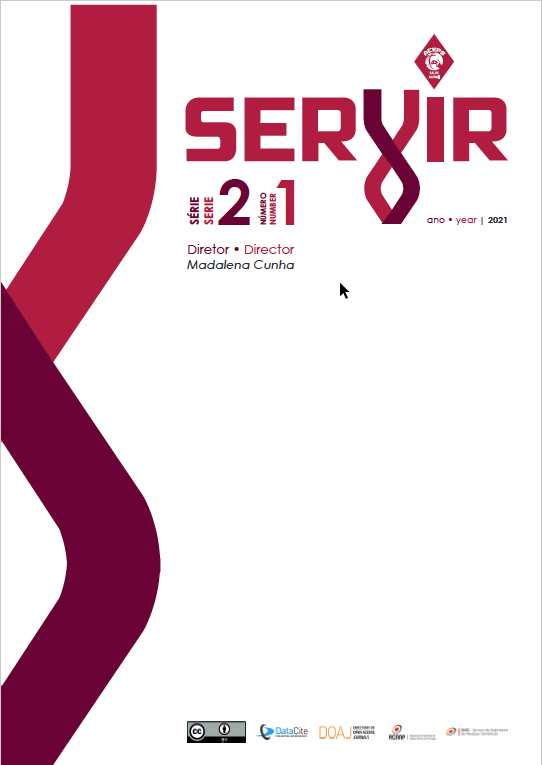Psychosocial and cognitive determinants of health and risk behaviors In adolescence
DOI:
https://doi.org/10.48492/servir0201.25942Keywords:
adolescence, health, psychosocial and cognitive determinants, schoolAbstract
Introduction: The adoption of health and risk behaviors is a complex and multifactorial process, related to adolescent development. However, this is still amatter of debate and reflection.
Objective: Determine the effect of psychosocial and cognitive variables on health and risk behaviors evidenced by adolescents.
Methods: Quantitative, descriptive-correlational study, in a cross-sectional cohort, in a sample of 829 adolescents, mostly female (53.92%). Data werecollected through a sociodemographic form and scales measured and validated for the Portuguese population (Piers-Harris Children’s Self-Concept Scale;Satisfaction with Social Support Scale; Assertiveness Scale of the Interpersonal Behavior Inventory; Scale of Locus de Health Control).
Results: Statistically significant effects in predicting health and risk behaviors in adolescents seem to occur due to the presence of interaction effects between psychosocial and cognitive variables. Specifically, behaviors appear to be associated, above all, with the interaction effect between self-concept and attitudes towards health. In other words, the meaning of this association suggests that adolescents with better behavioral self-concept and a more adequate preventiveattitude are the ones with better health-related behaviors.
Conclusion: It is noted that it is necessary to increase self-concept and improve attitudes towards the health of adolescents, so an integrated and appropriatedevelopment strategy for health promotion in a school context seems to emerge from this study.
Downloads
References
Albuquerque, C. (2004). Comportamentos de saúde e de risco na adolescência. Tese de Doutoramento não publicada. Universidade da Extremadura: Departamento de Psicologia e Sociologia da Educação.
Albuquerque, C., Vítor, V., & Oliveira-Albuquerque, C. (2008). Pretextos e contextos de risco na adolescência. Revista INFAD de Psicología- International Journal of Developmental and Educational Psychology, 4 (1): 179-184.
Alves, D., & Almeida, L., & Fernandes, H. (2017). Estilos de vida e autoconceito: um estudo comparativo em adolescentes. Revista Iberoamericana de Psicología del Ejercicio y el Deporte, 12(2): 237-247. https://www.redalyc.org/articulo.oa?id=311151242007
Bharathi, T. A., & Sreedevi, P. (2015). A study on the self-concept of adolescence. International Journal of Science and Research, 5(10), 3219–7064. ISSN 3219 – 7064
Breslow, L., & Breslow, N. (1993). Health practices and disability: some evidence from Alameda County. Preventive medicine, 22(1), 86–95. https://doi.org/10.1006/pmed.1993.1006
Figueiredo, J. P. (2015). Comportamentos de saúde, costumes e estilos de vida: Indicadores de risco epidemiológico avaliação de estados de saúde e doença. Tese de doutoramento em Ciências da Saúde, não publicada. Universidade de Coimbra: Faculdade de Medicina. https://estudogeral.sib.uc.pt/bitstream/10316/29621/1/Comportamentos%20de%20sa%C3%BAde_costumes%20e%20estilos%20de%20vida.pdf
Friedman H. L. (1989). The health of adolescents: beliefs and behaviour. Social science & medicine (1982), 29(3), 309– 315. https://doi.org/10.1016/0277-9536(89)90279-7
Lichner, V., Petriková, F., & Žiaková, E. (2021) Adolescents self-concept in the context of risk behaviour and self-care, International Journal of Adolescence and Youth, 26:1, 57-70, https://doi.org/10.1080/02673843.2021.1884102
Liu, W. C. (2000). A longitudinal study of academic self-concept in a streamed setting: home environment and classroom climate factors. University of Nottingham. https://doi.org/10.1348/000709905X42239
Masoumi, M., & Shahhosseini, Z. (2017). Self-care challenges in adolescents: A comprehensive literature review. PubMed, 31(2), 2–12. https://doi.org/10.1515/ijamh-2016-0152
Matos, A., & Albuquerque, C. (2006). Estilo de vida, percepção de saúde e estado de saúde em estudantes universitários portugueses: influência da área de formação. International Journal of Clinical and Health Psychology, 6: 647-663. http://www.aepc.es/ijchp/articulos_pdf/ijchp-197.pdf
McIntyre, T.M. (1995). Inventário de Comportamento Interpessoal. In Leandro, S.A., Mário, R. S. & Miguel, M.G. (Eds.) Provas Psicológicas em Portugal. Braga: APPORT, p. 193-207
O’Neill, T. L. (2015). Academic motivation and student self-concept. the Keys to Positively Impacting Student Success. Pais-Ribeiro, J.L. (1999). Escala de satisfação com o suporte social (ESSS). Análise psicológica, 3 (17): 547-558.
Pestana, M. H. & Gageiro, J. N. (2016). Análise de dados para as Ciências Sociais – A complementaridade do SPSS. Lisboa: Edições Silabo.
Ribeiro, J.L. (1994). Reconstrução de uma Escala de Locus-de-Controlo de Saúde. Psiquiatria Clínica, 15 (4), 207- 214 Sebastian, C. (2008). Development of the self-concept during adolescent. Trends in Cognitive Sciences
Shabaraya G., & Bhogle S. (2011). Relationship between Adolescents’ Health Beliefs and Health Behavior. International Journal of Medicine and Public Health.1(3):55-61. https://doi.org/10.5530/ijmedph.3.2011.9
Steptoe, A. & Wardle, J. (2001). Locus of control and helath behaviour revisited: A multivariate analysis of young adults from 18 countries. British Journal of Psychology, 92: 659-6722.
Steptoe, A., & Wardle, J. (1996) The european health and behaviour survey the development of an international study in health psychology, Psychology & Health, 11:1, 49-73. https://doi.org/10.1080/08870449608401976
Stevens, J. (1996). Applied multivariate statistics for the social sciences. Mahwah: Lawrence Erlbaum Associates.
Veiga, F. H. (2006). Uma nova versão da escala de autoconceito Piers-Harris Children’s Self-Concept Scale (PHCSCS-2). Psicologia e Educação. 5(1), 39-48. http://psicologiaeeducacao.ubi.pt/RPE_AH/RPE_AH%202006%20V5N1.html
Veiga, F. H. (2012). Transgressão e autoconceito dos jovens na escola (3ª ed.). Lisboa: Edições Fim de Século
White, C.A.(2011). Cognitive Behaviour Therapy for Chronic Medical Problems. Chichester: Wiley.
Widyarini, N., Retnowati, S., & Setiyawat, D. (2019). Using Theory of Planned Behavior to Explore Beliefs of Public Health Promoters in Promoting Adolescents’ Reproductive Health: Case in Tengger. In Proceedings of the 4th ASEAN Conference on Psychology, Counselling, and Humanities (Edt. Muhammad Salis Yuniardi). Volume 304: 317-321. https://doi.org/10.2991/acpch-18.2019.77
Zappe. J., Alves, C., & Dell’Aglio, D. (2018). Risk taking behavior in adolescence:systematic review of empirical studies. Psicologia em Revista, 24 (1): 79-100. http://dx.doi.org/10.5752/P.1678-9563.2018v24n1p79-100
Downloads
Published
How to Cite
Issue
Section
License
In order to promote the free circulation of knowledge, Servir is open access journal. All its content is available and protected under the Creative Commons license (CC BY 4.0).
The journal allows self-archiving in institutional repositories of all versions, which may become immediately available


